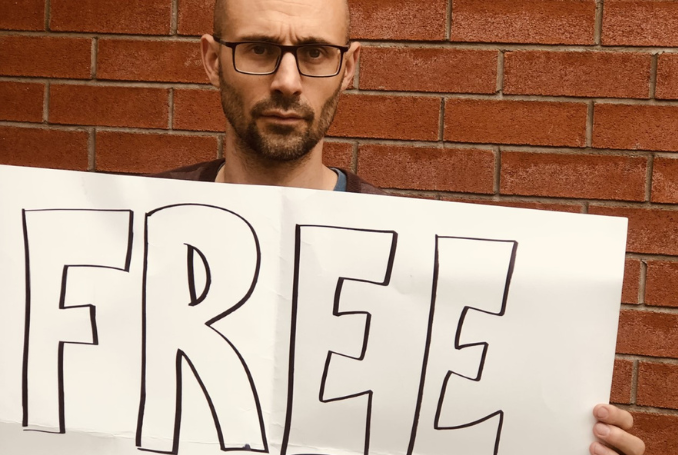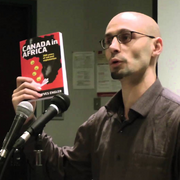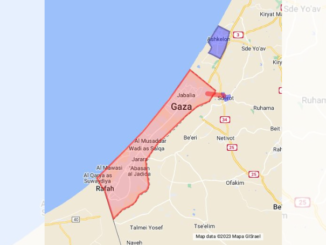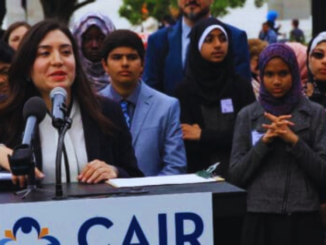
By Yves Engler
On Wednesday, August 31, I interrupted a major funding announcement at McGill to ask the head of the university about her suppression of Palestine solidarity.
As she spoke from the Faculty Club’s stage I asked Principal Suzanne Fortier, “Do McGill students have the right to oppose the killing of Palestinian children? Do they have the right to oppose Israeli colonialism and apartheid?” McGill’s principal failed to respond.
I then stated that her administration’s threat to cancel the student union’s funding after students voted overwhelmingly for a “Palestine Solidarity Policy” was “anti-democratic and anti-Palestinian”. I added it was “shameful” and made her “complicit in Israeli colonialism and violence”.
In 24 hours, my 70-second video has been viewed 80,000 times on Twitter. Though multiple corporate media outlets were in the room, they all appear to have ignored my disruption, which included me holding up a “Free Palestine” placard in the front of the room.
In March 71% of undergraduate students voted for a “Palestine Solidarity Policy” committing the Students’ Society of McGill University (SSMU) to take a stand against Israel’s system of racial discrimination. The resolution called for a host of measures including SSMU divesting from and boycotting “corporations and institutions complicit in settler-colonial apartheid against Palestinians.”
In March 71% of McGill undergrads voted to boycott firms complicit in Israeli apartheid. Admin responded by threatening student union funding. I interrupted a big funding announcement today to ask McGill’s head whether students have right to oppose killing of Palestinian children pic.twitter.com/No39BrI3lL
— Yves Engler (@EnglerYves) August 31, 2022
In response, B’nai B’rith “called on McGill University to immediately cease funding SSMU until it rescinds this bogus referendum result.” McGill’s administration acted by threatening to terminate its Memorandum of Agreement with SSMU, which regulates fees, use of the name, and other matters between the university and the student union.
In response, students organized rallies and outside groups petitioned the administration with over a thousand individuals emailing Fortier. Rock legend Roger Waters, author Yann Martel, former MP Libby Davies, author Chris Hedges, and 200 others signed a public letter criticizing the administration’s threats as anti-democratic and anti-Palestinian. On the eve of his July 15 performance at Montreal’s Bell Centre, Waters participated in a well-mediatized online rally in support of McGill’s Palestine solidarity activists.
McGill is the site of the most important campus battles over Canadian complicity in Palestinian dispossession. On one side are those promoting student democracy, academic freedom, and universalist values. On the other side of the fence, there are powerful outside pressure groups, wealthy donors, and proponents of apartheid.
The event I disrupted highlights one element of the power balance. It was a funding announcement for a project that partners McGill with Tel Aviv University. In another step in the corporatization of higher education, Canadian-Israeli billionaire Sylvan Adams put up $29 million to establish the Sylvan Adams Sports Science Institute. In recent years Adams has plowed tens of millions of dollars into various sports and cultural initiatives explicitly designed to whitewash Israeli apartheid and violence.
Zionist donors have significant influence at McGill. Pro-Israel individuals have contributed far more money to the university than pro-Palestinian voices, which has greatly strengthened anti-Palestinianism among administrators focused on funding.
The Israel lobby understands the fundraising dynamic. As I detailed here, it’s not uncommon for pro-apartheid voices to publicly call on the Jewish community to withhold donations to universities to pressure them to clamp down on pro-Palestinian activism. An understanding of fundraising dynamics partly explains why B’nai B’rith is so emboldened in their reaction to McGill.
Last month B’nai Brith announced a lawsuit against McGill University, SSMU and student group Solidarity for Palestinian Human Rights (SPHR), which sponsored the Palestine Solidarity Policy. B’nai Brith is suing an administration that effectively did what was asked of them by threatening SSMU’s funding arrangement. For their part, SSMU buckled in the face of administrative pressure and refused to ratify a Palestine solidarity policy backed by 71% of undergraduate voters.
In an interview with Rabble.ca, SPHR member Leila Kanafani labeled the suit “laughable”. She noted, “it’s ridiculous for B’nai Brith to also sue the McGill administration and the SSMU when they’re actually on their side and they’ve succeeded in stopping the policy from being implemented.” (SPHR says they haven’t been served with court documents so it’s unclear if B’nai Brith’s lawsuit announcement was simply a public relations exercise.)
Irrespective, B’nai Brith’s over-the-top response to student democracy has offered the Palestine solidarity movement a unique opportunity to talk about growing opposition to apartheid at Canada’s most famous university (and among youth more generally). Student activists have pushed back against the wealthy, pro-apartheid, forces dictating McGill’s policy.
SPHR says it won’t back down in the face of B’nai Brith’s legal threat. “I’m really not worried at all. In fact, it’s the opposite, we’re quite proud,” Kanafani told Rabble. “We’re going to walk on this campus with our heads held high. If this lawsuit is an attempt to intimidate us, to try and make us cower and afraid of bringing anything on, it’s invigorating us to do quite the opposite.”

– Yves Engler is the author of Canada and Israel: Building Apartheid and a number of other books. He contributed this article to The Palestine Chronicle. Visit his website: yvesengler.com.








